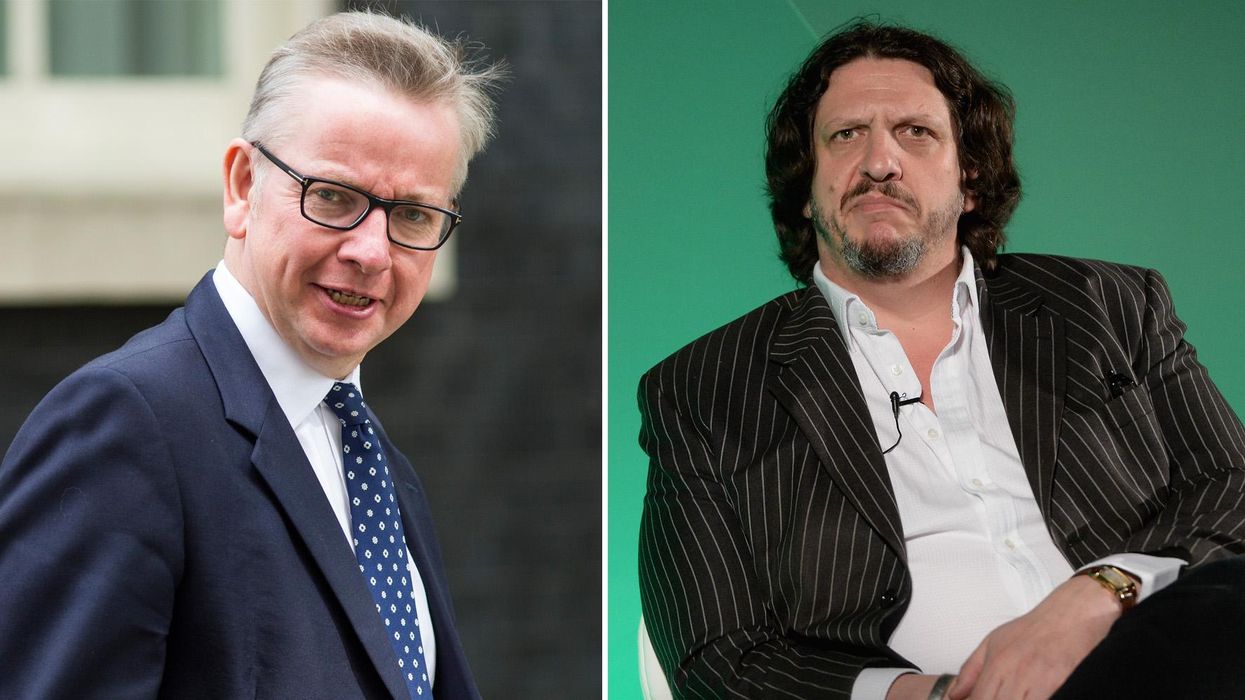Celebrities
Indy100 Staff
Jul 24, 2017

Picture:
Jack Taylor/Getty Images/Anthony Harvey
Jay Rayner, if you don't know who he is, is a restaurant critic, feature writer, and journalist.
He's written about food sustainability in the past - A Greedy Man in a Hungry Worldis the book with which he, perhaps most notably, debunks a few myths about consumption and describes how to eat more sustainably in the 21st century.
He was recently asked to speak at a round table discussion on 25 July to give him "food for thought in the early days of the new job" as Secretary of State for the Department of the Environment, Food and Rural Affairs.
He declined the offer, and his reasons were as follows:
After much hard thought, I have concluded I am just not grown up enough to play the game of British politics and sit in a room with a man of whom I think so little.
Yes, he may have done good by bringing in free school meals while at Education. Yes, he made positive moves while at Justice.
But since then he has disgraced himself. He was one of those who continued the £350 million-a-week EU lie and led us down the disastrous path to the utter folly of Brexit. He has been revealed to be a plotter and a conniver and all-round rather nasty piece of work. No, I cannot sit in a room with him and make talk, small, large or otherwise. Sorry. I’m just not that guy.
He also pointed out that Gove was one of the chief campaigners to leave the European Union, a move that will, in his opinion, cause large scale issues for our food supply chain.
He highlighted the declining degree to which we produce our own food, influenced by the rise of supermarkets.
In the early 1990s Britain’s self-sufficiency in food reached its highest in modern times.
We were producing just over 70 per cent of all the food we were eating.
Since then the story has been one only of decline.
We now produce 60 per cent of our own food, but because of exports only around 50 per cent of the food we eat is actually produced here.
He finished the written statement as follows:
I find it extraordinary that, in the correspondence inviting me to the meeting of food experts called by you, your colleague Fiona Gately said that Brexit would not be part of the discussion. She later retracted that verbally; said it was of course something we could discuss. The point I made to her then and I make now is that, where our food supply is concerned, Brexit is the only subject. It is implicated in every single aspect of our food supply chain and risks imperilling the very health of the nation.
A few years ago, when discussing food security in the UK, Lord Cameron of Dillington – a farmer and first head of the Countryside Agency – said Britain was just ‘nine meals from anarchy’. It would take just three days of empty supermarket shelves, just three days of meals missed by hungry children and despairing parents, for the country to descend into massive civil unrest.
When I first heard that statement I regarded it as an interesting and diverting piece of hyperbole. Now it feels to me like a prediction.
Of all the things that were said to me when I was researching my recent an article on the importance of migrant labour to our food supply chain, the one that stayed with me most came from Ian Wright of the Food and Drink Federation: ‘If you can’t feed a country you haven’t got a country’.
Amen to that.
It was reported that Britain could be forced to accept chlorinated chicken, meat subjected to growth hormones and pork sprayed with lactic acid as part of a post-Brexit trade deal with the United States.
The plans, pushed by International Trade Secretary Liam Fox, wouldn't be subject to EU rules, and would permit chemically cleaned food and unlabelled genetically modified food as part of the dropping of EU directives on farming due to Brexit.
Fox is reportedly in favour of dropping these rules, in disagreement with other members of cabinet, like Mr Gove.
Fox told the BBC that Britain could increase trade with the US by £40bn a year by 2030...
if we’re able to remove the barriers to trade that we have.
It will be a difficult discussion... but we’ve got great support from the United States and the administration as well as Congress to help push the agenda forward.
Top 100
The Conversation (0)













